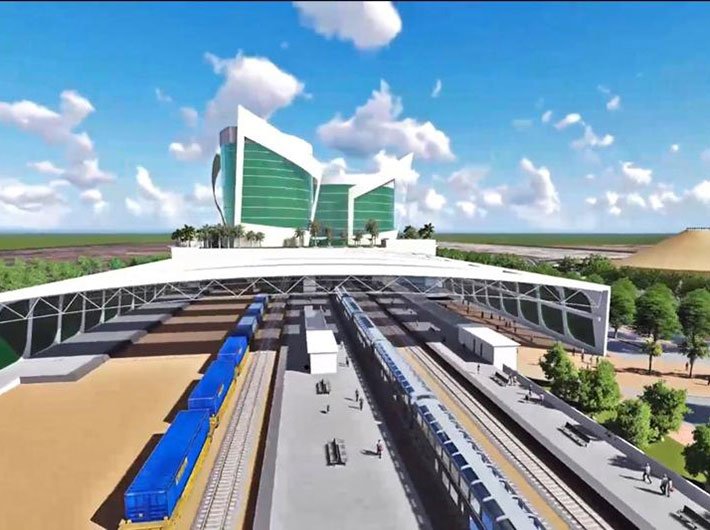New railway minister revives an ambitious non-starter: the station redevelopment project
Railways wants to jazz up 400 major railway stations by providing large, airy foyers, comfortable sitting areas, snazzy lounges, smart ticketing system, escalators and the works.
But there is a hitch. The railways has been peddling this idea of world-class railway stations for the past one decade, without much headway. There were, in fact, no takers when it was first pushed.
Another attempt was made to raise revenue through public-private partnership (PPP) mode to redevelop stations after the cabinet gave its nod in July 2015. The intent was for railways to monetise its land, while the private player was supposed to build infrastructure.
That too hit a hurdle. Only a very few private players took interest as they felt that 45 year lease period on offer was too less to get the returns.
The 400 A1 and A category stations were selected out of the 8,000 stations spread across the country.
Now, a fresh effort has been undertaken by the new railway minister, Piyush Goyal. Private players are now being wooed with longer lease periods, even up to 99 years in some stations, with terms that are quite lucrative.
The railways plans to send the proposal of leasing the stations to the cabinet committee on economic affairs in January 2018. It was earlier slated for October 2017, but got delayed.
The plan is to raise an investment of Rs 1.07 lakh crore to develop stations from the corporate giants under the non-fare category. “We do not intend to spend a single penny for this project as the entire funding can be garnered through the corporates,” a railway official says.
The railways calls it the world’s biggest transit oriented development (TOD) project.
A senior railway official said the project was “wrongly structured” due to which railways kept struggling to sell it to private players. “We have to have favourable conditions for the corporates,” the official said.
Railway officials argue that by leasing such stations to private players, railways will be able to garner enough funds to improve its infrastructure and modernise stations. A total of 2,700 acres of land for 400 stations is up for lease to private players, involving a cost of Rs 68,000 crore for commercial development and Rs 28,000 crore for revamping such stations.
The railways failed to get any takers in its first phase in 2015. It is now preparing a fresh strategy with more lucrative terms and conditions for the industry to lease the stations for up to 99 years. Earlier, the lease was for 45 years which received lukewarm response.
The station redevelopment project is aimed at making railways modern, unlock the true potential of its assets lying unused for
years and open new revenue streams for the national transporter.
Ever since the station development project was planned eight years back, it never looked promising to the private players to invest huge sums of money into it. Private players seemingly dissuaded themselves from developing commercial hubs at heavily crowded, congested and noisy railway stations.
“The plan was shelved because the industry was not happy with the terms and conditions,” an official says.
“The project looks like a theoretical exercise. Who will develop a commercial mall or a residential hub at the crowded and noisy railway stations?” asks Sunil Kumar, former advisor (safety) of the railway board.
He says PPP projects have always been a failure with the railways. He adds that even the Delhi Metro Rail Corporation has failed to fully monetise its land.
“Every new railway minister declares intentions to develop world-class stations, but nothing has worked out so far. Not even a single station has been developed into a world-class station in the last 10 years,” he said.
Sources in the ministry said Goyal was not pleased with the previous version of the project and he sought more lucrative conditions to be incorporated to woo private players.
One of the first things which Goyal wanted to incorporate was increasing the lease period up to 99 years to lure the corporate world and bring in massive investments.
Goyal had even claimed that many global companies have evinced interest in station modernisation plan. He said the World Bank is also keen to participate in this mega project.
According to the plan, industry players who would bag the contract will develop commercial hubs and top-notch amenities at the spare land while the railways will do the core job of platform extension, track laying and bridge and platform construction among others.
The challenge
In its first phase, the railways got the cabinet’s nod to the proposal of giving powers to general managers (GM) to monetise the spare land and lease the stations for 45 years in July 2015.
The GMs, however, failed to monetise the spare land.
“Expecting the GMs to attract revenue by monetising land and at the same time doing the core job of running the trains led to the failure,” an official points out.
Soon after this, the railways changed its strategy and formed Indian Railway Stations Development Corporation Ltd (IRSDC) to execute the project. IRSDC is a joint venture company of IRCON and Rail Land Development Authority (RLDA) falls under the ministry of railways, with an authorised capital of Rs 100 crore and equity participation in the ratio of 50:50.
A report by The Boston Consultancy Group and FICCI titled ‘Indian Railways Stations Redevelopment – transforming railways and creating win-win opportunities’, released in June 2017 underlined that PPP is a complex process. It said that lease period of 45 years and use of land for only commercial purposes may render the tier II cities’ stations to be less attractive as there is limited commercial potential in these cities.
The report lists out some of the risks that may affect the project. The risks include lack of long term infrastructure vision and plan, lack of engagement of key stakeholders, continuous change in design and sub-standard forecasting, litigation and legal issues.
It said that this kind of mega project needs a realistic expectation.
A former member of the railway board said that in Indian context not all the stations can be redeveloped. He said that there are very few stations where commercial hubs can be developed. Stations like Lucknow, Allahabad and Mumbai cannot be developed as they are cramped, he said.
“The railways’ main job is to run trains and maintain the tracks, which too they are not able to do properly. The energies are concentrated on such fancy projects and they gradually start losing focus on doing the core job,” he said.
He also said that now people are shifting their businesses away from railway stations.
“Forget about the utilisation of vacant land, there had been projects of the railways where it wanted to share freight traffic with private entities to run trains in industrial areas, even this did not work out,” he said.
However, a former chairman of the railway board cautioned that the railways’ main job is to transport people and goods and not venture into real estate activities.
It will be interesting to see whether the national transporter gets a favourable response from the domestic and global players, to give a pleasant experience to its passengers who continue to see railway stations as an eyesore.
[email protected]
(The article appears in the January 15, 2018 issue)



